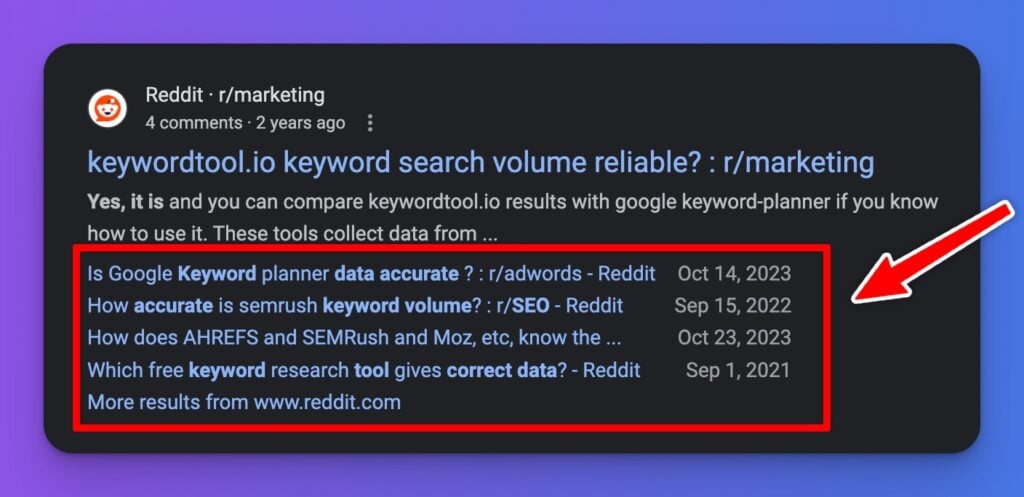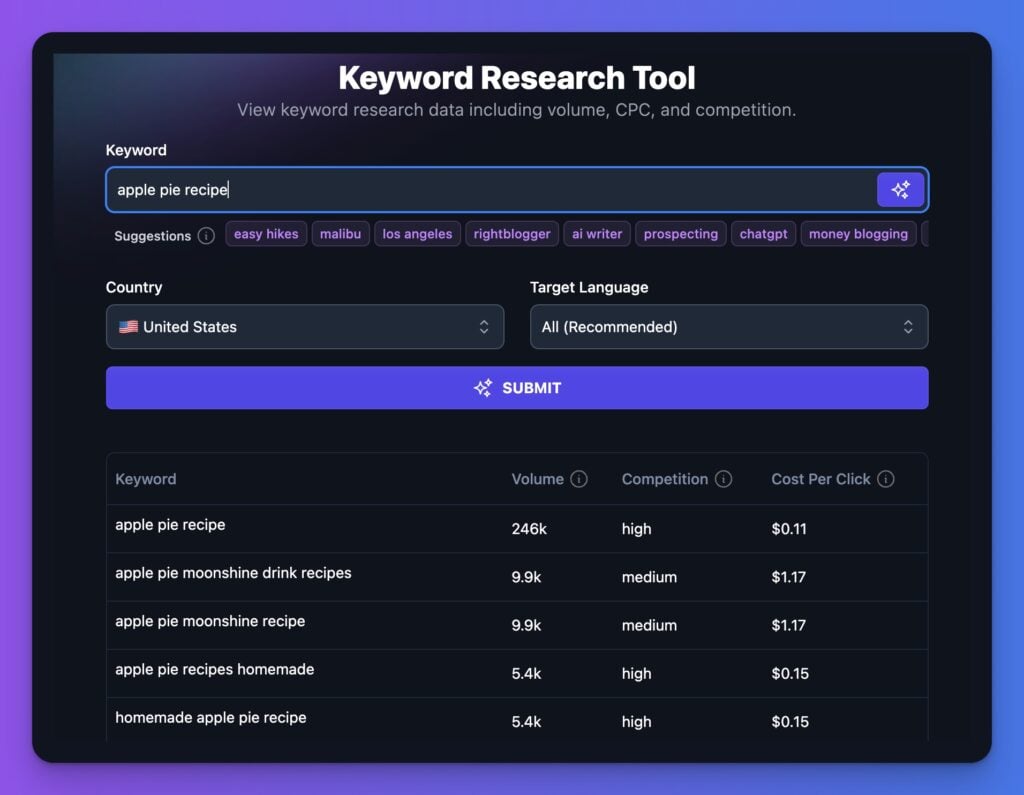I’ve had this conversation with just about every creator, marketer, and SEO pro I know. Are keyword tools reliable? Is the search volume data we make very real plans on, accurate? And I’m far from the only one talking about this…

Before we dive in, I wanna make my own bias on this topic clear. I own 2 different keyword tools—one you can use forever free on my blog, and the other inside RightBlogger, my suite of 70+ tools for creators. I’ve built these tools to give you only the most actionable data points, without all the fluff of extra (overwhelming) info.
🔑 Keyword tools are only directionally reliable & useful. They should be used to discover & validate topics, and prioritize content schedules. Even Google's own Keyword Planner tool, which is powered by data from real activity in Google's search engine, is often inaccurate and doesn't stack up with the figures reported in Google Search Console. Keyword tools should be used to validate pursuing a topic and prioritizing your content production schedule, but don't place much stock in search volume estimates being spot-on accurate.
Of course though, there’s a little more nuance to this conversation. For myself, I’ve boiled this debate down to two central questions:
- Do the thousands of dollars we’ve spent over the years on tools to discover the “right” keywords actually go to good use?
- Are we all making content (and business) plans based largely on the best-guesswork of a keyword research tool, just because we crave someone or something to tell us what we should be doing?
Like most things in life, the answers to these questions aren’t black & white—but they are both a yes.
1. Are keyword research tools worth spending money on? Yes. Keyword tools can give you actionable data points to help discover, validate, and prioritize the topics you create content about. This goes for both written and video-based content. For the latter, I made this free YouTube Keyword Research Tool that can be used specifically for identifying opportunities on YouTube.
2. Do many of us use keyword tools to be told which topics we should cover? Yes, and I’ve done this, too. There’s nothing wrong with needing a little guidance. Sometimes we just draw a blank on what to talk about next (my free Blog Post Idea Generator will help with that), and keyword tools offer up great discovery opportunities. Though I feel they’re best used in the context of validating & prioritizing content ideas.
Are Keyword Tools Reliable?
Sort of… sometimes… but not really. And some are just plain bad.
Keyword tools are only directionally reliable. They’re most useful for discovering, validating, and prioritizing content topics. Let’s walk through a real example from my own free tool, showing the biggest blindspot of keyword tools and why you shouldn’t rely solely on them to drive your content strategy.
I don’t think there are exactly 2,400 searches per month on Google for “homemade chocolate pie.” Based on the search engine results page showing 127,000,000 results for this query, I have a hunch there’s probably quite a few more people searching this term (and related ones that’ll surface very similar results).

In the case of this example above, I think my own keyword tool under-represents the amount of activity going on here.
Here’s why: Something most keyword tools don’t factor in very well (because it’s very difficult), is that the same recipe for a chocolate pie might appear in search results for tons of different related keyword phrases. A homemade chocolate pie recipe could rank for “chocolate pie recipe,” “best chocolate pie recipe,” “creamy chocolate pie recipe,” and any number of additional search terms.
So in reality, if you nail your on-page SEO efforts and put in the work to promote your content, you could realistically expect to get significantly more than 2,400 visits/mo from organic search if you rank high for the term “homemade chocolate pie,” because of all the other related terms you’ll likely swoop up.
The best content strategy is one that’s intimately in touch with the real wants, needs, hopes, and desires of your target audience. Keyword research can help along the way, but these are best used as just validation & prioritization tools, not as a source of truth for developing your entire strategy.
Is Search Volume Data Accurate?
Usually not. Even Google’s own Keyword Planner doesn’t claim to be completely accurate.
Check out my comparison of analyzing the term “homemade chocolate pie” on 4 of the top free keyword research tools. You’ll see there’s quite a lot of variance in how many monthly searches each tool reports back:
- Google’s Keyword Planner: 1,000 to 10,000/mo
- Free Keyword Research Tool by ryrob: 2,400/mo
- Ahrefs Keyword Explorer: 1,900/mo
- Ubersuggest: 2,400/mo

If you’re looking for an exact number of monthly search volume for a particular keyword phrase, you’re missing the forest for the trees.
Comparing your keyword research data against other tools though, is a great way to land on a range that you can be pretty confident in. Clearly, we can pretty reliably count on the number of monthly searches for “homemade chocolate pie” being on average somewhere around 2,000 to 3,000/mo.
How to Best Use Keyword Research Tools

Make no mistake, keyword research is still valuable. I do it almost daily.
If you leave this post with any takeaway from me though—it’s that you don’t rely on these tools to tell you what to create content about. Rather, use them (primarily) to make more informed decisions about the topics you already feel compelled to cover. And of course, there’s nothing wrong with occasionally turning to these tools for ideation when you’re having a dry spell.
1. Discover New Topics to Cover
I get it, sometimes I draw a blank on which topics I want to talk about next.
It’s totally fine to use tools like this when you’re in a pinch—just be honest with yourself about whether or not you’re using these tools to replace the work of thinking, feeling, and asking your audience about their pain points.
Your best content topics will always come from the mouths of your audience.
That said, keyword tools and idea generators can both help you can uncover insightful topics that resonate with your target audience—and have a proven search demand in your specific niche. This process can also help you make sure you’re not missing any key topics your audience is clamoring for answers about, that you hadn’t thought of yourself yet.
2. Validate Real Demand for a Topic Idea
This is my favorite use case for keyword research. When I have a topic I’m considering covering, but I’m not sure if it’s a real need for my audience, I’ll validate it with keyword research. This keeps me on track with relevant content ideas.
In a sense, keyword research provides as-close-to concrete evidence that real people are actively seeking information on the topics you’re planning on creating about. This validation process ensures that your energy is going towards meeting the needs of your audience effectively.
3. Prioritize & Rank Ideas in Your Content Schedule
Through analyzing search volumes and greater trends (like with Google Trends), keyword research helps you to strategically prioritize the topics you’re loaded into your content calendar.
For example: Assuming the estimated ranking difficulty is about the same between Keyword A and Keyword B, it’s a better move to first pursue creating content on the topic that has the most search volume. You can get to the other one later.
Using Google Trends, “homemade apple pie” consistently has more search activity than “homemade chocolate pie” as we can see here:

While both terms may be relevant to your baking blog or YouTube channel, the data clearly suggests you should pursue the apple pie recipe first.
By focusing on topics with higher search volumes, you can maximize your traffic potential over time and attract a larger audience to your blog, website, YouTube channel, online store, or in-person business. This deliberate prioritization allows you to optimize your content strategy for quicker growth and increased visibility.
The Only Keyword Research Tools I Use Today
So we’re on the same page that keyword data and search volume estimates should always be taken with a big ol’ grain of salt. That said, this information (from most tools) is reliable enough to be directionally useful in topic discovery, validation & prioritization.
1. Free Keyword Research Tool by ryrob (My Own)

Why I love it: Aside from my obvious bias that my friend Andy & I built this free keyword tool, I love this tool specifically because of the idea engine we’ve built into the functionality of the tool. When you find a keyword you’re interested in creating content about, just click on the little 💡 icon and it’ll whip up dozens of different ways & angles you can approach this topic with. I’ve come up with some of my most fun long-tail content pieces lately, using this feature.
2. Ahrefs

Why I like it: What I like most about Ahrefs, is how they visualize the keyword data they present, into super handy graphs and charts that I can use to make quick decisions.
Ahrefs is the OG of SEO tooling for content creators, and since my early days of blogging and content marketing work, I’ve never stopped using their tools. They consistently improve over time, and they’re honestly fantastic for more advanced bloggers & creators—but it comes at a very steep price, more than $1,000/year. So, it’s not practical for most creators to use Ahrefs.
3. RightBlogger’s Keyword Tool

Why I like it: It’s super easy to use, and presents only the crucial information you need in order to make informed content decisions—estimated monthly search volume, competition, and cost per click—in columns that you can quickly sort and rearrange based on your goals. Plus, RightBlogger subscribers get unlimited access to this tool and over 70+ more content creator tools for $29.99/mo.
One of my biggest gripes about so many keyword tools out there, is that they cram in tons of other information, that to most people, lead to instant overwhelm. We made this tool to be the opposite of that.
What Should I Do Now That You’ve Shattered My Beliefs, Ryan?
I’m so glad you asked! And no, not all hope is lost. Keyword tools are still extremely useful, but only when used in the right ways.
While it’s tempting to rely on keyword tools to do the work for you, when it comes to choosing what to create content about—your most meaningful topics that’ll really connect with your audience, are the ones that come from solving real challenges… not just chasing search traffic for the sake of traffic.
Keyword research tools are best utilized for accomplishing these three activities:
- Discovery: Find smart topics to create content about, with proven search demand in your niche.
- Validation: Confirm that real people are searching for answers on a topic you’re interested in talking about.
- Prioritization: Rank the topics in your content calendar by search volume to maximize your traffic potential over time.
Remember, keyword tools are simply… tools. Use them to help streamline aspects of your content creation process, but don’t over-rely on them to your own detriment.
When you’re too dependant on these tools, it’s easy to find yourself in a position where you’re writing (or talking) about a bunch of topics that sure, have a seemingly high amount of demand in your niche, but you may not actually care about, yourself.
Keep an eye on that one, because your audience can always feel whether or not you’re truly interested in the subjects you’re talking about. More than that, it’s a fast track to burning yourself out and losing interest in your business or passion project.

Truly agree with this blog, Thank you for sharing.
you’re welcome, Sree! glad you found this one useful 🙂
Great tips — and the visuals help a lot. Thank you!
you’re so welcome, heather! 🙏
Thank you for the article, you are an inspiration to all.
I got you, bro! appreciate the kind words 🤘